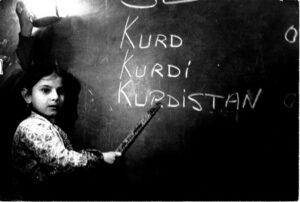The upheaval from the “Arab Spring” across the Middle East has given the 30 million Kurds, who live mostly in parts of Iraq, Turkey, Syria and Iran, new hopes of their long-held dream of independence. In a series of stories, VOA correspondents in the Middle East and Washington found that Kurdish aspirations are met by a complicated reality on the ground.
 It’s lunchtime, and kebabs are on the grill at a newly-opened Kurdish restaurant in the Washington area.
It’s lunchtime, and kebabs are on the grill at a newly-opened Kurdish restaurant in the Washington area.Hekmat Bamarni came here from northern Iraq in the 1970s, and he sits at a table in the restaurant with a man bearing a scar on his forehead from a shrapnel wound.
Both men were Kurdish independence fighters known as Peshmerga, or “those who face death.”
“As a Kurdish person, yes, we have a dream like everybody else – like a Turk, Arab, Iranian,” Hekmat Bamarni said. “We want independence too.”
But Kurds in Iraq and elsewhere have endured harsh crackdowns in pursuit of that dream.
As the largest ethnic minority in the Middle East without a state, Kurds at one time depended on an armed insurgency to press their cause.
But the U.S. invasion of Iraq, the Arab Spring revolts and other recent events in the Middle East have solidified their political ambitions.
“This is certainly a changing moment and an exciting moment for Kurds and those who study the Kurds because it appears as if those boundaries that were set at the state formation period seem to be breaking away,” said Denise Natali, a Middle East expert at the National Defense University in Washington.
That seems to be the case in Syria, where Kurds have taken control of much of that country’s northeastern tip amid a national anti-government uprising.
Meanwhile in Turkey, Kurds are using unprecedented new freedoms to reverse years of discrimination and alienation.
In Iran, the Western crackdown on Tehran over its nuclear ambitions has given Iranian Kurds hope for change.
And in Iraq, Kurds have run their own affairs in the northern part of the country since the ouster of Saddam Hussein’s regime.
But Natali said this self-rule has forced Iraqi Kurdish leaders to face geopolitical reality in a landlocked region.
“The survivability of the region depends on open borders, and positive or at least working relations with neighboring states,” she said.
Natali said the neighboring states often play Kurdish factions off against one other, leaving Kurds alienated and caught in national politics or regional disputes.
Michael Rubin, a former Pentagon official now at the American Enterprise Institute, said Kurdish leaders themselves often pay lip service to nationalist aspirations as they acknowledge the realities.
“I just came back from Kurdistan,” he said. “And certainly among the students, among the professors, among the intellectuals – but not the politicians – there’s this real fear that again we have independence within our grasp and the neighboring powers and our own politicians are going to prevent it from happening because they’re always unable to reach consensus.”
But Rubin says the younger generation of Kurds, inspired by their Arab counterparts, are growing increasingly impatient with their political leaders as they see gains that were made in the Arab Spring.
And across the Middle East, Kurdish factions are taking steps to control their destinies.
(VOA)















